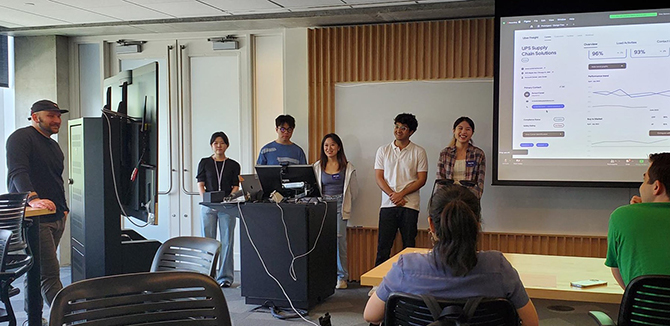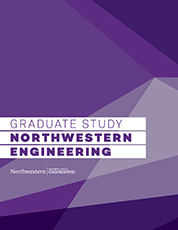Moving Cargo, Learning Lessons
Sherry Xu (EDI ‘24) discusses her EDI Design Sprint project and the importance of user research to her success working with Uber Freight.

There is no such thing as an insignificant page on a company’s website.
That’s one of the lessons Sherry Xu (EDI ‘24) learned during the Design Sprint course that is part of Northwestern's Master of Science in Engineering Design Innovation (EDI) program.
Design Sprint allows students to work directly with an innovative client to gain practical experience while helping an actual business. Xu’s project connected her with Uber Freight, an app-based marketplace that matches trucking carriers with shippers for cargo transportation.
Her challenge? Redesign an internal website page that displays freight carrier’s information to make it more useful to Uber Freight’s employees.
“Even a seemingly trivial page can benefit from multiple rounds of design critiques and iterations,” Xu said. “Every touchpoint on a page can affect the teams' decision-making process, so even small tweaks can have a big impact on how the teams interact with the page and ultimately serve their customers.”
On Uber Freight, users can post load and shipping details to be matched with a network of carriers. The app allows for pricing analytics, real-time load tracking and electronic proof of delivery. Uber Freight, a division of Uber, was founded in 2017 and is valued at more than $3 billion.
That was about all Xu and the four EDI students she worked with knew about the company and freight shipping in general prior to the project. It made for a steep but vital learning curve.
“B2B products require a deeper understanding of the business in order to understand the user's journey,” Xu said. “User research was essential for this project for mapping out the workflow and service blueprint, which helped us identify touchpoints, pain points, and opportunities.”
The project was made even more challenging because it was an internal website and not a customer-facing product for which there were readily available user reviews. Xu and her team relied on Uber Freight employees’ willingness to share their every-day workflow and experience with the internal tool. The team also stressed the importance of granular details during their user interviews.
Those interviewing skills were not something Xu felt confident with prior to her time in EDI.
“The EDI program has given me the opportunity to gain new experience,” she said. “I interviewed industry workers to understand something that was new to me, and I learned a lot about how to ask effective questions and build rapport.”
Coupled with a willingness to ask for design reviews and respond to feedback, these interviews and the application of human-centered design lessons Xu learned in her EDI classes led to a final presentation praised by Uber Freight leadership.
“I think we nailed it,” she said. “Our design process and design concepts were clearly presented, and we were able to complete the project within a good amount of time.”
Success with this project has given Xu greater confidence heading into the rest of her time in the EDI program and beyond. She said she is looking forward to applying some of the business-world lessons she learned with Uber Freight to her coursework.
Her ultimate mission is to graduate and find a job as an innovative leader in the tech industry.
“My goal is to be a product designer after graduating and work toward the goal of being a product manager in the future,” she said. "I am passionate about translating technologies into desirable, feasible, viable products or services to meet people's need, and I want to work for a company that shares my values."

